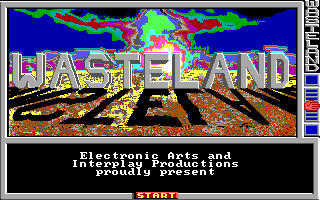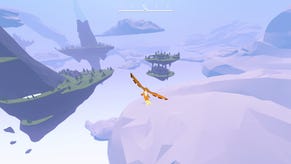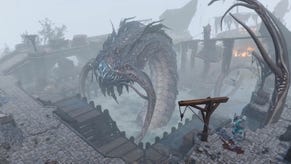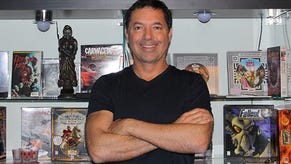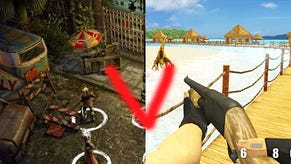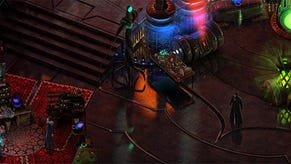Back To Black Isle: Fargo On Obsidian Joining Wasteland 2
Avellone of this
Last week's wonderful shock news was that Brian Fargo and his team at inXile hope to recruit Chris Avellone and his team at Obsidian to work with them on the successfully startkicked sandbox RPG Wasteland 2. If funding for Wasteland 2 can reach $2.1 million (it's currently at $1.8m, with 14 days left to go), it means a sort of dream team of ex-Black Isle staff would be working on a game that consciously harkens back to that golden age of cRPGs. I had a quick chat with Brian Fargo about what the potential partnership actually means, his thoughts on the wildly successful crowdsourcing of the game to date, whether the hiring of Planescape brain Avellone means a more fixed rather than freeform RPG, how his Kicking It Forwards crowdsourcing reinvestment initiative is going, and how he'd love to out-Kickstart Doublefine.
RPS: You must be over the moon at the moment.
Fargo: I’ve been over the moon for two weeks.
RPS: Did you think it was all going to work out, or was there a moment of doubt?
Fargo: Well, when we first went out I was a little afraid because we were asking for more money than anybody had ever asked for before, and I was afraid it would be misconstrued as us trying to be greedy when in fact I knew that it would be the minimum amount of money to do the product justice.
RPS: Be honest, you’re wearing a hat made of gold right now. You went straight out and bought that.
Fargo: Is my camera on?
RPS: I can just tell. There’s a sort of reverberation in your voice that can only be made by a man wearing precious metal.
Fargo: (laughs)
RPS: I’m really glad it worked out. So we've just heard your news about Obisidan potentially joining the game's development, which is pretty amazing.
Fargo: I’ve been working on it since the beginning. It’s not like that was easy for me to pull together but there was a desire for me…we’ve been wanting to work together for some time. There’s a mutual respect and of course when it comes to Fallout, that’s yet more people who helped work on that, so I’m super-happy to be working with them. And especially Chris [Avellone] in particular. He’s a real talent and he’s gonna help…
To me, I bring on all these people and they help to set the bar very high so that everybody follows. Even the concept artist you might have seen, Andrée Wallin, you get this super-talent involved and they get the bar up there and then everybody else follows.
RPS: You’ve got to hope there isn’t a weak link among all these super people, but it does sound like a hell of a team.
Fargo: It’s fantastic. And the thing about Chris [Avellone] is that he’s hyper-passionate about Wasteland. For him, it was one of the seminal products that got him into the industry, developed his love for roleplaying games, so I think it’s really kind of a dream for him too.
RPS: Yeah, especially because Obsidian had some bad news the other day. To walk into this is great, because they’re straight onto what they were talking about doing anyway.
Fargo: Yeah, this product is right in his wheelhouse.
RPS: I’m glad because he was talking about doing his own thing and I did think “two turn-based roleplaying games at the same time, doesn’t that increase the odds of one of them not coming to pass?"
Fargo: They may end up doing one later, but right now they’re in the middle of a big project that they have to do so the timing is such that I don’t think they were prepared to do something immediately, where I was. So just the timing worked out well.
RPS: Have you been kicking around ideas yet, or is that still a little way off?
Fargo: Just a little bit. Next week is when we’ll be kicking around ideas. We have to work out the business details first before they want to let Chris run around in our offices. Next week that will certainly be the case. We’ve talked a little bit about it but no great amount of detail yet. Chris has just been dying to announce it, so this is great.
RPS: Do you think it’s going to work naturally or might there be a clash, in that Wasteland is about player agency and freedom, while the game he’s most revered for, Planescape, is very much a fixed, set narrative?
Fargo: No, they won’t clash at all. What Chris brings is this wonderful density to his levels. So he’ll be involved with the overall, but he’ll also be given some sections in particular that he’ll be able to put his stamp on. It’s sort of like in science fiction novels where multiple authors get involved and do their own parts, all with their own style.
To me, it’s going to be cool because it’s going to give a greater sense of variety as you move around the world. But there’s no way on Earth this is not going to be a sandbox type game.
RPS: Who’s going to handle the story element? Are you going to do that in-house or are you going to pool it like those science fiction authors where it’s a completely collaborative thing?
Fargo: It’s going to be a little bit myself and Mike Stackpole making the world sense come together. So we’l be helping to coordinate the overarching story of it all, but the individual parts, that’s where we have different people, whether it’s Chris Avellone, or Liz Danforth, who are working on their areas.
Creatively, when you work on a product like this, you say “listen, we need this prison yard and just make sure at the end they walk out with an Uzi, OK, I don’t care what happens in there but just make sure they get an uzi at the end for the next part.” They say “great” and we turn them loose.
The most important that this adds, and what our players continue to want and ask for from us, is scope and scale. That’s what this is about. Every time the numbers go up, the game just gets a little bit bigger and a little more dense, and this helps ensure that.
RPS: Have you had any really crazy moments, in the middle of the night thinking “I wonder if we could make five million, what could we do then?” Sort of fantasy figures.
Fargo: (laughs) Dare to dream, right? I guess our fantasy number is if we end up getting over what Double Fine did, that would be…
I was looking back at the budget for the original Fallout. That was about three million dollars, and that included a lot of audio, a lot of cinematics and some publisher overhead. Also, the salary levels were different back then. To me, if we get to something like three million dollars that really starts to…I mean, we’re going to be able to make a great game as it is, it’s not like a problem, but it provides a little more leeway I guess in terms of not having to work 12 hour days.
RPS: How do the team sizes for this and Fallout compare? Have you got roughly the same headcount?
Fargo: We’re going to be contracting out more on this. There are better tools now than there were back then, so it allows us to have a lot of stuff that’s already built for us and to contract out more. And we’re a little smarter now too.
RPS: Kicking it Forward was a lovely little notion. Have you seen lots of takeup for it?
Fargo: Yeah, it’s slowly catching on. We have about thirteen different developers signed up for it. If you look at Kickstarter, it’s an unbelieveable thing to get your financing done this way. If you get your product done for the amount of money you get, as soon as you ship, day one, you’re going to go right into the profit, right?
That’s such a wonderful thing it seems like, why not pay it back by helping other people to get into the same position we’re in. I don’t know how anybody can say no to it, right? It’s not an unreasonable request, it’s a small amount, and it’s going to help us all if we stick together.
RPS: Yeah, it could potentially be make or break for a lot of things. We’ve been seeing a lot of projects that aren’t quite coming off, but 5% of other project's cash going into them would probably solve it.
Fargo: Well, imagine if Notch, if Minecraft, had been done through Kickstater. He would be probably financing 3-4 million dollars’ worth of projects right now. It’d probably be enough to do all of them! Something that I found out later, is that the French film industry takes a piece of every movie ticket and puts it back into the film business. This is a less political way of doing it. It is an honor system, but for the most part the indie development community is made up of good, honest people on the whole.
RPS: Do you have a strategy for how you’re going to pick the projects you want to kick it forward into, or would you do a vote with the community.
Fargo: The way I see it working is that if somebody has a profit and wants to give part of it away, you give it away however you see fit. We’re not going to set up a committee or do anything complicated, you just decide where it goes. So if you’ve got $50,000 to give, then go do it.
And so, for me, if I’m personally handed out the money, I’ll probably sit with my guys and spend a little bit of diligence, look at projects, see what’s interesting, the people, getting some sense of whether they can deliver or not, that sort of thing. I would be caring most about giving the money to a group that can actually do it.
RPS: You’re at risk of becoming a sort of gaming godfather figure.
Fargo: (laughs) One of the interesting things about Kickstarter – I was looking at some statistical information – is that Kickstarter goes to a trough level and then starts to build back up toward the end. So some people have said “boy, things have really slowed down”, but apparently they all do at this point. I think this will help spike it back up again but we’re not concerned even though it’s ‘slowed down’. It’s still right where it needs to be.
RPS: There must be people who look and think “well, they’ve got enough, why bother funding now?” But if you can keep adding new goals to aim for, like this, there’s no reason it can’t just keep rolling.
Fargo: Well, for the last week people have been saying “Brian, we’d love to give you more but can you tell us what we’re going to get for it?” And I’ve been wanting to tell them about this so it’s been frustrating to just sit in silence because I didn’t want to just throw out something and come back two days later with something else. A lot of gamers have been waiting to hear what else they get when they hit some higher tiers and here is part of the answer.
RPS: Do you know how much of Obsidian would be working on it if it came to pass? Would it primarily just be Chris and a couple of guys, or would it be the whole team?
Fargo: There’s two parts of it. They have a lot of tools also over there that they’ve built over the years that are going to help save us some time. So there’s a tool component that takes their time – historical time – and then primarily it’s just Chris and maybe a couple of the guys, but it’s mainly from a design perspective. Pure writing/design.
RPS: Thanks for your time.




